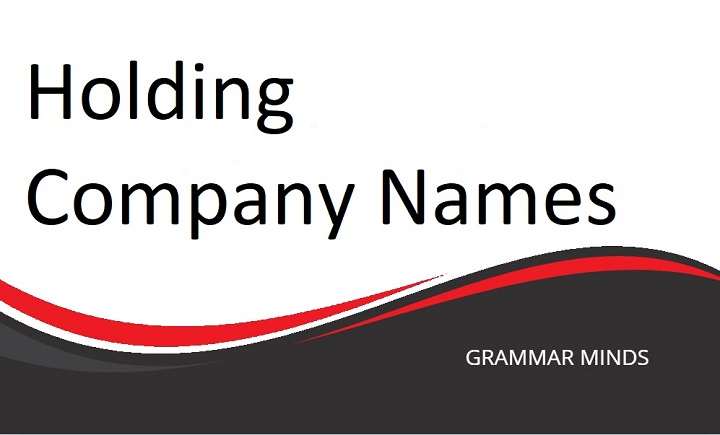Starting a holding company is a significant business decision that involves more than just financial planning. One of the most crucial steps in this process is choosing the right name for your holding company. The name you select can significantly impact your company’s branding, credibility, and legal standing. In this guide, we’ll walk you through everything you need to know about selecting the perfect holding company name, including tips, legal considerations, and branding advice.
What is a Holding Company?
Before diving into naming strategies, it’s essential to understand what a holding company is. A holding company doesn’t produce goods or services directly. Instead, its primary role is to own and manage other companies’ stocks or assets. These subsidiary companies may operate in various industries such as real estate, finance, or manufacturing.
The holding company’s name, therefore, needs to be broad enough to represent different industries, flexible enough to adapt to future ventures, and strategic in positioning your brand.
Why is the Name Important for a Holding Company?
First Impressions Matter
The name of your holding company will be the first impression many people have of your business. Whether you’re dealing with potential investors, subsidiaries, or partners, the name plays a crucial role in how they perceive your brand. A well-thought-out name can give you credibility, instill confidence, and enhance trust.
Legal Implications
Your company name must be unique and comply with legal regulations. In many jurisdictions, certain words are restricted in company names, especially when it comes to financial entities or companies that have wide-reaching responsibilities. A good name also needs to pass trademark tests and be available for registration.
Flexibility for Expansion
Since holding companies often diversify into various industries, the name should provide room for future growth. If your name is too specific or industry-focused, it might limit the opportunities available for expansion down the line.
Characteristics of a Great Holding Company Name
Simplicity and Memorability
A name that’s simple and easy to pronounce will be remembered by clients, investors, and partners alike. Avoid overly complicated or technical terms that could confuse people. Ideally, the name should be short and sweet but packed with meaning.
Examples:
- Berkshire Hathaway
- Alphabet Inc.
- Softbank Group
Professionalism
Since holding companies often deal with finances, mergers, acquisitions, and corporate governance, a professional name is essential. The name should reflect authority, stability, and trustworthiness.
Neutrality
The holding company’s name should not be tied to a particular industry, especially if you plan on diversifying. A neutral name offers flexibility and can cater to various ventures.
Uniqueness
The name should distinguish your business from competitors. Avoid generic terms that might get lost in a sea of similar names. You want your holding company to stand out, and having a unique, creative name can help achieve that.
Naming Techniques for Holding Companies
Use Founder’s Names
One common technique for naming a holding company is to use the founders’ names. This method is often seen in family-run holding companies or companies where the founder’s reputation is central to the brand.
Examples:
- Koch Industries (named after Fred Koch)
- Walton Enterprises (from the Walton family of Walmart fame)
Acronyms
Many successful holding companies use acronyms for simplicity and memorability. Acronyms can be particularly effective when the full name of the company is too long or complex. However, make sure the acronym isn’t already in use or easily confused with other businesses.
Examples:
- GE (General Electric)
- JAB Holding (Joh. A. Benckiser)
Abstract Names
An abstract name doesn’t necessarily have any particular meaning but can be highly brandable. The advantage of an abstract name is that it leaves room for interpretation and growth. It also tends to stick in people’s minds if done right.
Examples:
- Alphabet Inc. (Google’s holding company)
- Exor (A major holding company from Italy)
Geographic Reference
Another method is using geographic locations to anchor your company’s identity, especially if it has strong roots in a particular region or country. This approach is often used by companies that want to emphasize a connection to their community or country.
Examples:
- Dubai Holding
- Asia Pacific Group
Descriptive Names
A descriptive name reflects what your company does but remains broad enough to allow for future expansion. For a holding company, this could refer to management, capital, or enterprises without tying the name to a specific industry.
Examples:
- Capital Group
- Global Ventures Holding
Legal Considerations in Naming Your Holding Company
Name Availability
Before you decide on a name, you must ensure that it’s available for use. Check your country’s corporate registry and trademark database to confirm that your name is not already in use. In the United States, for example, you can use the U.S. Patent and Trademark Office (USPTO) database to verify this.
Trademark Protection
Trademarking your holding company’s name protects your brand from being used by others. Once you register your trademark, no other company can legally use your name in the same industry. Trademarking is especially important for holding companies that manage brands across various sectors.
Domain Name Availability
In today’s digital world, securing a matching domain name for your holding company is just as important as registering the business itself. The domain should be simple, reflect your company’s name, and be easy to spell. If the domain name you want is taken, consider using different domain extensions (.com, .net, .org) or slight variations.
Restricted Words
Many jurisdictions restrict the use of certain words in company names,
Also Read
10 Synonyms for “Team Player” to Elevate Your Communication
particularly words like “Bank,” “Trust,” or “Insurance,” which imply regulated financial activities. Be sure to consult with legal experts or use an online business name checker to ensure compliance.
Branding Your Holding Company
Develop a Strong Brand Identity
A holding company’s name is just one piece of the puzzle. To create a successful brand, you’ll also need to develop a consistent visual identity (logo, colors, fonts) and a strong brand message. The brand should communicate reliability, strength, and long-term vision.
Be Consistent Across Platforms
Your holding company’s name, logo, and brand message should be consistent across all platforms—whether that’s your website, business cards, or social media accounts. This consistency builds trust and makes your company easily recognizable.
Marketing Considerations
Though holding companies don’t typically engage in consumer-facing marketing, they still need to appeal to potential subsidiaries, investors, and partners. A well-thought-out name combined with strong marketing strategies can significantly boost your company’s visibility in the business world.
Common Mistakes to Avoid When Naming Your Holding Company
Being Too Industry-Specific
Avoid names that are too tied to one industry. Holding companies often diversify into different sectors over time, and an industry-specific name could limit future opportunities.
Choosing Trendy Names
What’s trendy now might not be in the future. Opt for timeless, professional names rather than those that are based on current trends or buzzwords.
Ignoring Legal Implications
Failing to check for name availability, restricted words, or trademark conflicts can lead to legal troubles down the road. It’s worth taking the time to ensure your chosen name is legally sound.
Overcomplicating the Name
While a unique name is important, don’t go overboard by making it overly complex. Keep it simple, memorable, and easy to spell.
Choosing a holding company name is an important step in establishing your business. The name should not only be legally compliant and easy to remember but also represent the essence of your company’s mission and values. Whether you opt for a personal, descriptive, or abstract name, it’s crucial to consider both short-term functionality and long-term scalability.
By taking the time to carefully select the right name, you can set your holding company up for future success and growth.







